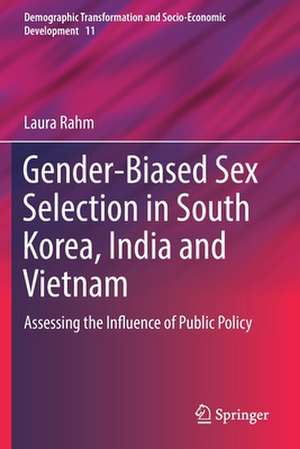Gender-Biased Sex Selection in South Korea, India and Vietnam: Assessing the Influence of Public Policy: Demographic Transformation and Socio-Economic Development, cartea 11
Autor Laura Rahmen Limba Engleză Paperback – 14 aug 2020
| Toate formatele și edițiile | Preț | Express |
|---|---|---|
| Paperback (1) | 381.05 lei 6-8 săpt. | |
| Springer International Publishing – 14 aug 2020 | 381.05 lei 6-8 săpt. | |
| Hardback (1) | 388.29 lei 6-8 săpt. | |
| Springer International Publishing – 29 iul 2019 | 388.29 lei 6-8 săpt. |
Preț: 381.05 lei
Nou
Puncte Express: 572
Preț estimativ în valută:
72.92€ • 76.71$ • 60.85£
72.92€ • 76.71$ • 60.85£
Carte tipărită la comandă
Livrare economică 09-23 ianuarie 25
Preluare comenzi: 021 569.72.76
Specificații
ISBN-13: 9783030202361
ISBN-10: 3030202364
Pagini: 340
Ilustrații: XXVI, 340 p. 53 illus.
Dimensiuni: 155 x 235 mm
Greutate: 0.51 kg
Ediția:1st ed. 2020
Editura: Springer International Publishing
Colecția Springer
Seria Demographic Transformation and Socio-Economic Development
Locul publicării:Cham, Switzerland
ISBN-10: 3030202364
Pagini: 340
Ilustrații: XXVI, 340 p. 53 illus.
Dimensiuni: 155 x 235 mm
Greutate: 0.51 kg
Ediția:1st ed. 2020
Editura: Springer International Publishing
Colecția Springer
Seria Demographic Transformation and Socio-Economic Development
Locul publicării:Cham, Switzerland
Cuprins
1. Gender-Biased Sex Selection in Asia: Motives, Methods, Magnitudes.- 2. History and Theory of Public Policies against Sex Selection.- 3. Methodology.- 4. South Korea.- 5. India.- 6. Vietnam.- 7. Cross-Country Comparison: Policies, Patterns and Processes.- 8. General Conclusion: Limited Evidence that Policies Normalize SRB.
Notă biografică
Laura Rahm is Postdoctoral Fellow in Political Sociology at the Center for Population and Development (CEPED). She specializes in public policies and programs against son preference, gender-biased sex selection and other harmful practices. Her recent publications appeared in Population and Development Review, Critique Internationale, and Men and Masculinities Journal. Laura holds a Masters in International Relations from the University of Passau and a PhD in Political Sociology and Demography from Sorbonne University Paris. She serves as a consultant and trainer in the first Global Programme to Prevent Son Preference and Gender-biased Sex Selection carried out by UNFPA with funding from the EU.
Textul de pe ultima copertă
This book provides an in-depth analysis of the influence of public policy on sex selection. Three Asian countries were chosen for the comparative policy analysis, namely South Korea, India and Vietnam that share in common a historical legacy of son preference, high levels of sex imbalances and active policy response to curbing the growing demographic masculinization of their nations. The research based on the data collected from field work in the three countries shows that despite the adoption of very similar anti-sex selection policies the outcomes have been markedly different for each of the three countries. These unexpected diverse outcomes are explained partly by their different historical and cultural contexts, and partly to the different social, political and economic institutions and dynamics. This monograph offers careful and detailed explanations of both within and across country diversities in policy outcomes, pointing to the importance and the limits of cross-national policylearning and adoption, and raising questions about the efficacy of international organizations’ current approaches to global policy and knowledge transfer.
Caracteristici
Provides an in-depth analysis of anti-sex selection policies Includes 117 key informant interviews, participant observations and demographic data analysis Results point to policy inefficiency and the limitations of policy transfer Relevant for academics and practitioners concerned with gender equality















